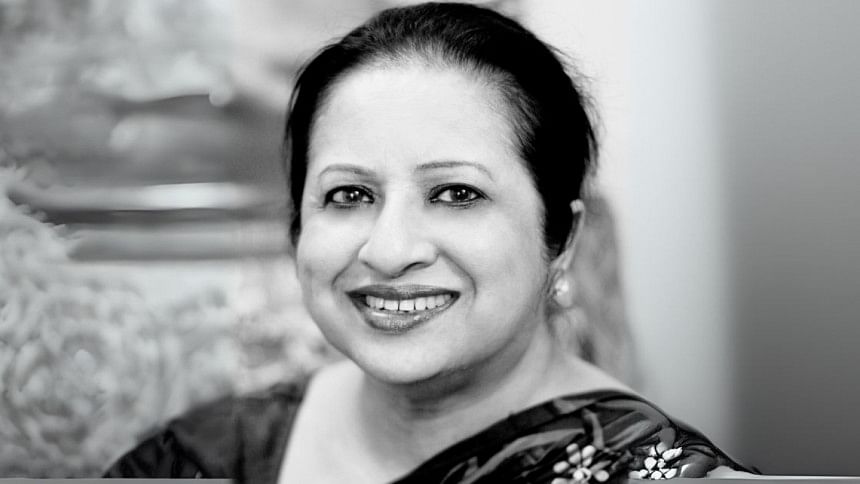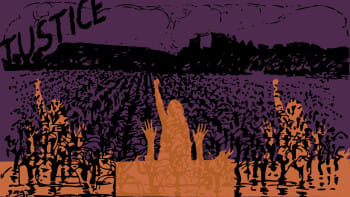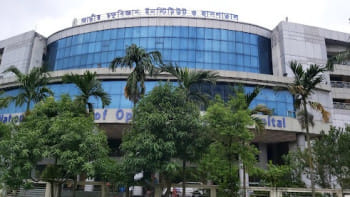Remembering Sigma Huda’s trailblazing activism against gender-based violence

Every year, civil society around the world seeks to refocus attention on violence against women and girls during the 16 Days of Activism against Gender-Based Violence campaign, which commences on November 25. This year, while most look to the long path that lies ahead to realise gender equality, I would like to take this moment to look back, to remember one of the pioneers in the fight against gender-based violence (GBV). On July 17, 2024, while the nation was embroiled in an unprecedented political crisis and revolution, Bangladesh lost one of its staunchest advocates for women's rights and gender equality: Sigma Huda. As one of the country's most senior female lawyers, practising since just before the birth of the nation, she not only shattered the proverbial glass ceiling, but also made sure it could never be rebuilt. How did she do so?
I could say she did so by fighting tooth and nail to become the first woman to be enrolled in a law degree programme at the University of Peshawar—at a time when women were denied entry into law in many parts of the world—and then going on to become a founding partner at one of the oldest law chambers in Bangladesh.
I could say she did so by founding and helping to set up countless NGOs that have been instrumental in advancing women's rights in our country, such as the Bangladesh National Woman Lawyers Association (BNWLA), the first NGO comprised exclusively of women lawyers to fight for women's rights, and to encourage more women to join the legal profession and collectively wage the legal battle against gender inequality. She founded the Acid Survivors Foundation (ASF), the first NGO dedicated to victims of acid violence. She also fought for the rights of pregnant and abandoned women by founding the Association for the Prevention of Septic Abortion, Bangladesh (BAPSA) and Bangladesh Breastfeeding Foundation, and serving as the president of the Center for the Training and Rehabilitation of Destitute Women, now renamed as Home for Destitute Women and Children.
I could say she did so by being the first woman in Bangladesh to establish and become a partner of a law firm in 1971, Chancery Chambers, which would go on to become a leading law firm in the country. She then went on to become one of the first women to hold leadership positions in the two most important lawyers' associations in the country: as member and assistant secretary of the Supreme Court Bar Association, and twice elected as a member of the Bangladesh Bar Council—the apex body created by statute to enrol lawyers, fix and prepare conditions of enrolment and discipline in legal practice in Bangladesh—for the terms 1995-98 and 2001-04. She was also a member of Bangladesh Labour Law Reform Commission in 1991-95, and in 1985, she served as the regional vice-president of the International Federation of Women Lawyers (FIDA).
I could say she did so by representing Bangladesh at the United Nations General Assembly in 1978, where she was allocated to the Third Committee to work on the drafting of the Convention on the Elimination of All Forms of Discrimination against Women (CEDAW). She was then among those who mobilised the feminist movement in Bangladesh to pressurise the state to ratify CEDAW.
I could say she did so by becoming the UN's first special rapporteur on human trafficking in 2004, producing technical reports and setting global standards to help combat sexual trafficking of women and children. These continue to be cited and applied globally even today. She conducted missions to and held bilateral negotiations with the governments in countries where women and children were most at risk of trafficking—from Bahrain, Kuwait, Saudi Arabia, the UAE and Lebanon to Thailand, Japan and Nigeria. Her groundbreaking 2006 report presented before the 62nd session of the UN Commission on Human Rights dispelled several misconceptions that operated against women in prostitution at the legal and institutional levels, and established how the demand for prostitution drives sexual trafficking of women and children, which was hitherto unacknowledged. In recognition of her work against trafficking, she was also appointed to the National Council for Women's Development, the highest national body for the development of women, by the prime minister of Bangladesh. She remained a board member of the Coalition against Trafficking in Women – Asia Pacific.
I could say she did so by being among the first to call out the legality of marital rape and the misinterpretation of Islamic law to ostensibly justify spousal violence, among other misogynistic practices, on national and international forums—at a time when almost no one else would. It is for this reason that, in July 1985, The New York Times decided to feature her as one of the three women from over 13,000 participants from 157 countries who attended the UN's Third World Conference on Women in Nairobi. I came across this article in November 2020, when I was researching on the marital rape exception clause in Bangladesh to help draft the writ petition challenging it before the Supreme Court. Even in 2020, over three decades later, we were still struggling to openly discuss these issues, as was demonstrated by social reaction to the persistent marital rape of a child bride from Tangail in October 2020, which ultimately killed her.
I could say she did so by leading the first known case in Bangladesh in which a mother was appointed as the sole guardian of her child in 1982, at a time and place where this right was exclusively given to fathers and women were systematically denied the right to have guardianship over their children in the event of divorce. This case set a landmark precedent, which subsequently enabled many women to also become sole legal guardians of their children during divorce proceedings, and she would go on to utilise this precedent to secure this long-denied right to sole guardianship of children for many other women facing divorce.
I could say she did so by leading numerous public interest litigation cases that established the rights of and challenged grave miscarriages of justice. For instance, in 1999, she filed a writ before the Supreme Court challenging the government's large-scale eviction of women in prostitution from their residences in the red-light areas of Tanbazar and Nimtoli of Narayanganj, at a time when most of society and the state saw them as "illegal vagrants." She argued that the state's forced eviction was in violation of their constitutionally guaranteed fundamental rights to livelihood and liberty, and the prevailing law of tenancy, leading to the court ruling in the favour of the evicted women.
I could say all of this and more, but the list would not end, because that was the extent of her dedication to the empowerment of women and pro-bono work for the most marginalised behind closed doors, at a time when social media did not document and grant immediate validation for every professional achievement or social justice intervention. From marital rape to misinterpretation of Islamic laws to women in prostitution, she had to face violent backlash from conservative elements in the country for challenging the status quo and combatting taboo topics. This was an era quite distinct from the one we are accustomed to today, where there were no social media or mobile phone cameras that could help garner quick support or solidarity campaigns, while documentation of the violent opposition that feminists in Bangladesh faced was also few and far between. But from being the only female student in her law class in university to being one of the first female lawyers practising at the Supreme Court of Bangladesh, confronting controversy after creating ruptures in patriarchal spaces and practices had become second nature to her.
She may have left us today, but her legacy for the empowerment of women, be it at the home, on the roads or in the courtroom, lives on. Thank you for your trailblazing activism, for not backing down in the face of overwhelming backlash, and for making it that much easier for the future generations of activists to fight for what is right.
Taqbir Huda is a human rights lawyer who is currently pursuing LLM at Harvard Law School. He serves on the civil society advisory group for Executive Director of United Nations Entity for Gender Equality and UN Under-Secretary-General Sima Bahous. He can be reached at [email protected].
Views expressed in this article are the author's own.
Follow The Daily Star Opinion on Facebook for the latest opinions, commentaries and analyses by experts and professionals. To contribute your article or letter to The Daily Star Opinion, see our guidelines for submission.

 For all latest news, follow The Daily Star's Google News channel.
For all latest news, follow The Daily Star's Google News channel. 












Comments